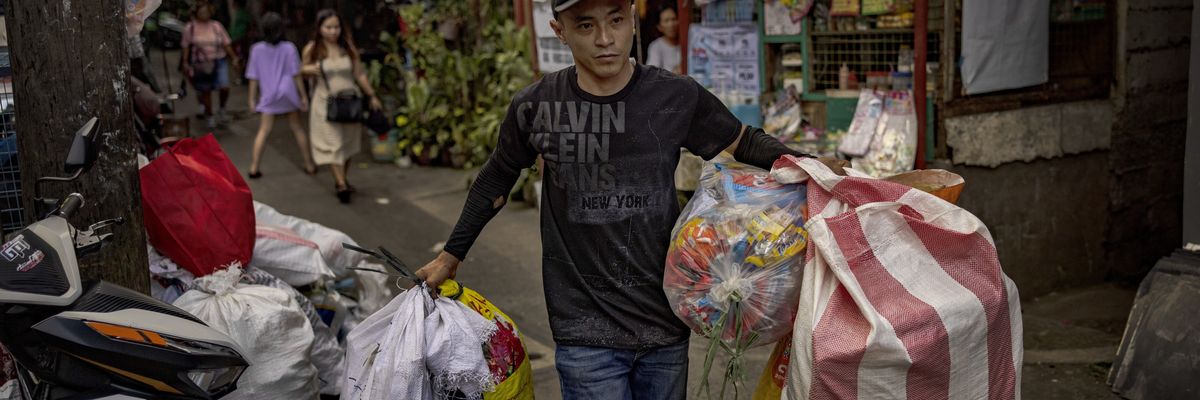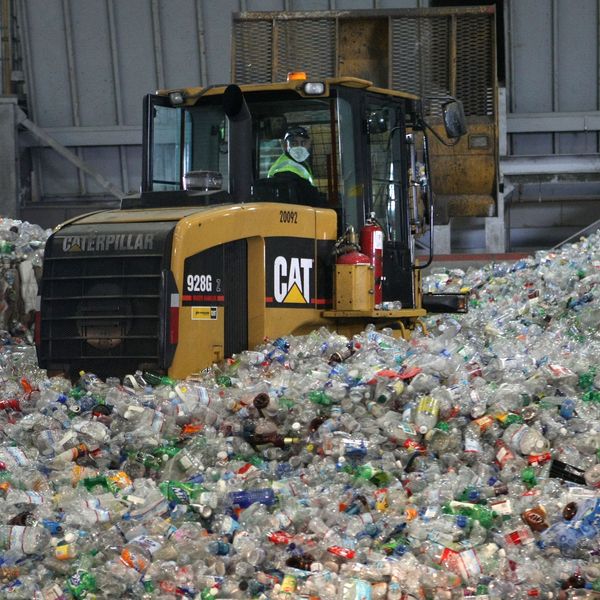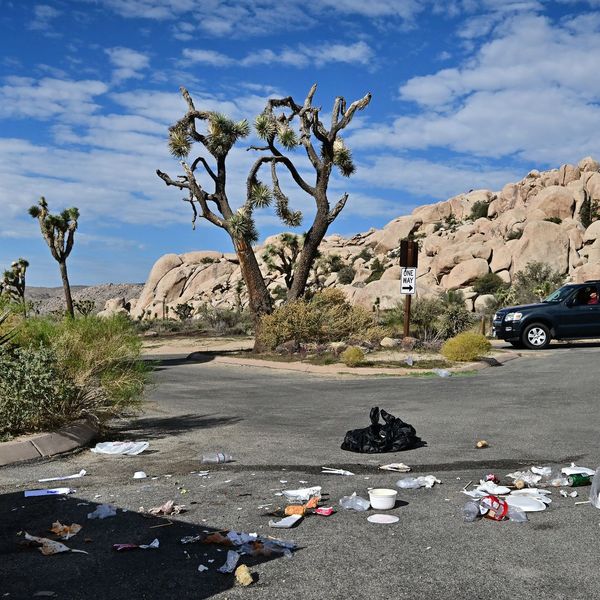
A village worker scavenges recyclable materials, including single-use plastics, to sell to a "Trash to Cashback" scheme in exchange for groceries, on January 4, 2024 in Quezon, Metro Manila, Philippines.
Shut Out of Treaty Summit, Campaigners Call for Elimination of Plastic Sachets
"Plastic pollution is a global crisis, fueled by our addiction to single-use plastics," said one organizer.
Amid concerns over the exclusion of Indigenous leaders, environmental advocates, and scientists from a four-day summit beginning Saturday in Bangkok to help advance a global plastics treaty, campaigners on Friday called on the political leaders and experts who will be in attendance to develop "robust criteria" to eliminate single-use plastics by drastically cutting down on their production.
Break Free From Plastic (BFFP) led a call for delegates, who will represent United Nations member states, to focus the talks on single-use plastics like sachets—small, sealed pouches and packets that have flooded markets in Asia and much of the Global South as businesses see them as affordable and convenient.
"Plastic pollution is a global crisis, fueled by our addiction to single-use plastics," said Von Hernandez, global coordinator of BFFP. "The solution is clear: Eliminate these nonessential products and reinstate reuse and refill systems which have been in place before our markets were overwhelmed with sachets and other disposable plastics."
A 2020 report by GAIA found that sachets account for an estimated 52% of the residual plastic waste stream and increasingly "defile the natural landscape, choke waterways, harm wildlife, and threaten livelihoods like tourism and fisheries."
Multinational corporations that sell fast-moving consumer goods like soda, chewing gum, and over-the-counter medications are major contributors to what GAIA called the "sachet economy," which has led to one of the most common types of plastic pollution in Africa and Southeast Asia.
"It is essential to reject the empty promises of petrochemical and fossil fuel industries who pursue profit over our collective welfare and avoid ineffective technologies like plastic credits and chemical recycling."
Tara Buakamsri, country director for Greenpeace Thailand, expressed hope that the Thai government will use the upcoming meeting as a "once-in-a-generation opportunity to end the plastic crisis by championing a global plastics treaty that limits production and bans single-use plastics."
"It is essential to reject the empty promises of petrochemical and fossil fuel industries who pursue profit over our collective welfare and avoid ineffective technologies like plastic credits and chemical recycling," said Buakamsri.
The meeting is the latest step in a treaty process that began in 2022, when countries agreed to hold talks hammering out the first legally binding treaty to stop plastic pollution.
The final treaty negotiations are set for November 25-December 1 in Busan, South Korea.
At the meeting in Bangkok, policymakers aim to "identify criteria for plastic products, chemicals, and product design, as well as potential sources and means of implementation for a plastics treaty, including financial mechanisms," according to BFFP.
But civil society groups have denounced the U.N. for including in the talks only two dozen invited technical experts and members of national delegations—who include plastic and oil industry representatives, in the case of countries such as China and Iran.
Jyoti Mathur-Filipp, executive secretary for the Intergovernmental Negotiating Committee (INC), told campaigners in a letter last month that countries had not agreed to allow observers to participate in the talks.
"Civil society and rights holders, including Indigenous peoples, must be recognized as essential stakeholders," said Dharmesh Shah of the Civil Society and Rights Holder Coalition on Plastics Treaty. "We are deeply disappointed that the INC Secretariat and [U.N. Environment Program] have not shifted their stance on observer participation despite multiple representations from the civil society and rights holders groups."
"The exclusion of these constituencies," added Shah, "disregards the fundamental human right to participation in environmental decision-making, a right that is vital for ensuring that the voices of all stakeholders, especially those most affected, are heard and respected."
An Urgent Message From Our Co-Founder
Dear Common Dreams reader, The U.S. is on a fast track to authoritarianism like nothing I've ever seen. Meanwhile, corporate news outlets are utterly capitulating to Trump, twisting their coverage to avoid drawing his ire while lining up to stuff cash in his pockets. That's why I believe that Common Dreams is doing the best and most consequential reporting that we've ever done. Our small but mighty team is a progressive reporting powerhouse, covering the news every day that the corporate media never will. Our mission has always been simple: To inform. To inspire. And to ignite change for the common good. Now here's the key piece that I want all our readers to understand: None of this would be possible without your financial support. That's not just some fundraising cliche. It's the absolute and literal truth. We don't accept corporate advertising and never will. We don't have a paywall because we don't think people should be blocked from critical news based on their ability to pay. Everything we do is funded by the donations of readers like you. Will you donate now to help power the nonprofit, independent reporting of Common Dreams? Thank you for being a vital member of our community. Together, we can keep independent journalism alive when it’s needed most. - Craig Brown, Co-founder |
Amid concerns over the exclusion of Indigenous leaders, environmental advocates, and scientists from a four-day summit beginning Saturday in Bangkok to help advance a global plastics treaty, campaigners on Friday called on the political leaders and experts who will be in attendance to develop "robust criteria" to eliminate single-use plastics by drastically cutting down on their production.
Break Free From Plastic (BFFP) led a call for delegates, who will represent United Nations member states, to focus the talks on single-use plastics like sachets—small, sealed pouches and packets that have flooded markets in Asia and much of the Global South as businesses see them as affordable and convenient.
"Plastic pollution is a global crisis, fueled by our addiction to single-use plastics," said Von Hernandez, global coordinator of BFFP. "The solution is clear: Eliminate these nonessential products and reinstate reuse and refill systems which have been in place before our markets were overwhelmed with sachets and other disposable plastics."
A 2020 report by GAIA found that sachets account for an estimated 52% of the residual plastic waste stream and increasingly "defile the natural landscape, choke waterways, harm wildlife, and threaten livelihoods like tourism and fisheries."
Multinational corporations that sell fast-moving consumer goods like soda, chewing gum, and over-the-counter medications are major contributors to what GAIA called the "sachet economy," which has led to one of the most common types of plastic pollution in Africa and Southeast Asia.
"It is essential to reject the empty promises of petrochemical and fossil fuel industries who pursue profit over our collective welfare and avoid ineffective technologies like plastic credits and chemical recycling."
Tara Buakamsri, country director for Greenpeace Thailand, expressed hope that the Thai government will use the upcoming meeting as a "once-in-a-generation opportunity to end the plastic crisis by championing a global plastics treaty that limits production and bans single-use plastics."
"It is essential to reject the empty promises of petrochemical and fossil fuel industries who pursue profit over our collective welfare and avoid ineffective technologies like plastic credits and chemical recycling," said Buakamsri.
The meeting is the latest step in a treaty process that began in 2022, when countries agreed to hold talks hammering out the first legally binding treaty to stop plastic pollution.
The final treaty negotiations are set for November 25-December 1 in Busan, South Korea.
At the meeting in Bangkok, policymakers aim to "identify criteria for plastic products, chemicals, and product design, as well as potential sources and means of implementation for a plastics treaty, including financial mechanisms," according to BFFP.
But civil society groups have denounced the U.N. for including in the talks only two dozen invited technical experts and members of national delegations—who include plastic and oil industry representatives, in the case of countries such as China and Iran.
Jyoti Mathur-Filipp, executive secretary for the Intergovernmental Negotiating Committee (INC), told campaigners in a letter last month that countries had not agreed to allow observers to participate in the talks.
"Civil society and rights holders, including Indigenous peoples, must be recognized as essential stakeholders," said Dharmesh Shah of the Civil Society and Rights Holder Coalition on Plastics Treaty. "We are deeply disappointed that the INC Secretariat and [U.N. Environment Program] have not shifted their stance on observer participation despite multiple representations from the civil society and rights holders groups."
"The exclusion of these constituencies," added Shah, "disregards the fundamental human right to participation in environmental decision-making, a right that is vital for ensuring that the voices of all stakeholders, especially those most affected, are heard and respected."
- 143 Fossil Fuel and Chemical Lobbyists Target Plastics Treaty Talks ›
- Celebrities Join Greenpeace in Demanding Biden Go Big on Global Plastics Treaty ›
- As Global Plastics Treaty Negotiations Begin, the Stakes Could Not Be Higher ›
- Ahead of Plastics Treaty Talks, Millions Demand Production Cuts | Common Dreams ›
- Opinion | Will World Leaders Deliver the Plastics Treaty We Need? | Common Dreams ›
Amid concerns over the exclusion of Indigenous leaders, environmental advocates, and scientists from a four-day summit beginning Saturday in Bangkok to help advance a global plastics treaty, campaigners on Friday called on the political leaders and experts who will be in attendance to develop "robust criteria" to eliminate single-use plastics by drastically cutting down on their production.
Break Free From Plastic (BFFP) led a call for delegates, who will represent United Nations member states, to focus the talks on single-use plastics like sachets—small, sealed pouches and packets that have flooded markets in Asia and much of the Global South as businesses see them as affordable and convenient.
"Plastic pollution is a global crisis, fueled by our addiction to single-use plastics," said Von Hernandez, global coordinator of BFFP. "The solution is clear: Eliminate these nonessential products and reinstate reuse and refill systems which have been in place before our markets were overwhelmed with sachets and other disposable plastics."
A 2020 report by GAIA found that sachets account for an estimated 52% of the residual plastic waste stream and increasingly "defile the natural landscape, choke waterways, harm wildlife, and threaten livelihoods like tourism and fisheries."
Multinational corporations that sell fast-moving consumer goods like soda, chewing gum, and over-the-counter medications are major contributors to what GAIA called the "sachet economy," which has led to one of the most common types of plastic pollution in Africa and Southeast Asia.
"It is essential to reject the empty promises of petrochemical and fossil fuel industries who pursue profit over our collective welfare and avoid ineffective technologies like plastic credits and chemical recycling."
Tara Buakamsri, country director for Greenpeace Thailand, expressed hope that the Thai government will use the upcoming meeting as a "once-in-a-generation opportunity to end the plastic crisis by championing a global plastics treaty that limits production and bans single-use plastics."
"It is essential to reject the empty promises of petrochemical and fossil fuel industries who pursue profit over our collective welfare and avoid ineffective technologies like plastic credits and chemical recycling," said Buakamsri.
The meeting is the latest step in a treaty process that began in 2022, when countries agreed to hold talks hammering out the first legally binding treaty to stop plastic pollution.
The final treaty negotiations are set for November 25-December 1 in Busan, South Korea.
At the meeting in Bangkok, policymakers aim to "identify criteria for plastic products, chemicals, and product design, as well as potential sources and means of implementation for a plastics treaty, including financial mechanisms," according to BFFP.
But civil society groups have denounced the U.N. for including in the talks only two dozen invited technical experts and members of national delegations—who include plastic and oil industry representatives, in the case of countries such as China and Iran.
Jyoti Mathur-Filipp, executive secretary for the Intergovernmental Negotiating Committee (INC), told campaigners in a letter last month that countries had not agreed to allow observers to participate in the talks.
"Civil society and rights holders, including Indigenous peoples, must be recognized as essential stakeholders," said Dharmesh Shah of the Civil Society and Rights Holder Coalition on Plastics Treaty. "We are deeply disappointed that the INC Secretariat and [U.N. Environment Program] have not shifted their stance on observer participation despite multiple representations from the civil society and rights holders groups."
"The exclusion of these constituencies," added Shah, "disregards the fundamental human right to participation in environmental decision-making, a right that is vital for ensuring that the voices of all stakeholders, especially those most affected, are heard and respected."
- 143 Fossil Fuel and Chemical Lobbyists Target Plastics Treaty Talks ›
- Celebrities Join Greenpeace in Demanding Biden Go Big on Global Plastics Treaty ›
- As Global Plastics Treaty Negotiations Begin, the Stakes Could Not Be Higher ›
- Ahead of Plastics Treaty Talks, Millions Demand Production Cuts | Common Dreams ›
- Opinion | Will World Leaders Deliver the Plastics Treaty We Need? | Common Dreams ›

